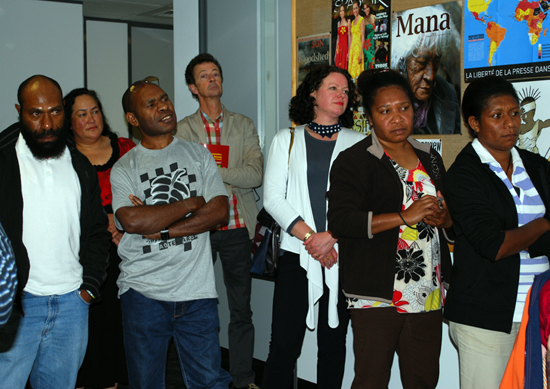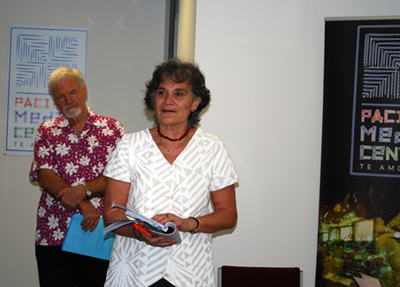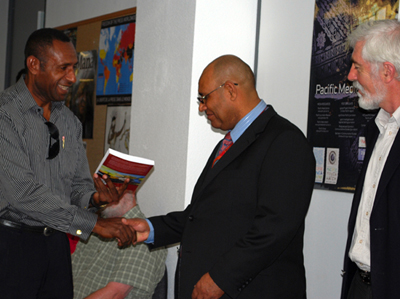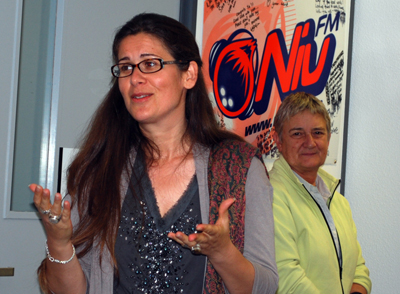
Communicators in Oceania have a duty not only to inform and investigate but also to interpret the impact of global and local future trends in the region, says New Zealand’s only professor of Pacific studies.
They need to interpret how they influence daily life in Papua New Guinea and the region, said Tagaloatele Professor Peggy Fairbairn-Dunlop.
Speaking at the launching of a new book at AUT University's Pacific Media Centre today, Tagaloatele said the role of the media in developing countries needed to be examined given the diversity of languages, cultural values and beliefs. Communication was the key to development and she cited the role of radio stations in colonial times but there was a need to break free from Western research dominance.
Communication was the key to development and she cited the role of radio stations in colonial times but there was a need to break free from Western research dominance.
Tagaloatele praised Communication, Culture and Society in Papua New Guinea: Yu Tok Wanem? as a book strengthening a rich tradition of Melanesian research.
She also said this new book located research at the “heart of journalism” and media education.
The book – with a subtitle in Tok Pisin meaning “What are you talking about?” – was co-edited by PMC research associate professor Evangelia Papoutsaki of Unitec; Brother Michael McManus, head of communication arts at Divine Word University in Madang, PNG; and journalist and media educator Patrick Matbob, also at DWU.
Book highlights
Tagaloatele said some highlights included:
• Pacific journalists were bold, strong, unafraid and “not sure who are their friends” as they communicated knowledge to people, exposed abuses of power and corruption, “guarded against lawsuits” and acted ethically.
• Journalists had a social conscience, looking and probing into things which many prefered to keep hidden – “the unspeakable things - violence against women, justice and equity and how funding is spent”, for example.  • The book was scholarly and academically robust and compiled by researchers who were knowledgeable and finding the gaps that “need looking at”.
• The book was scholarly and academically robust and compiled by researchers who were knowledgeable and finding the gaps that “need looking at”.
• A rethink of the curriculum and a moving away from traditional journalism training to a more multi-skilled approach, with subjects like human resource management and international relations.
Papua New Guinean High Commissioner William Dihm, who flew up from Wellington especially for the launch and was supported by many wantok students, also praised the book and the positive messages it gave young Papua New Guineans.
He was presented with a signed copy of the book by postgraduate AUT University communication studies student Henry Yamo, who was also one of the contributors.
Support networks
Yamo, who was featured in the latest edition of the university student publication Debate, also spoke about the value of the book and the support networks involved for publishing the young researchers’ work.
Co-editor Dr Papoutsaki acknowledged Yamo and the young contributors and said the book was a strategic publishing initiative for the independent voice of Melanesian researchers and a contrast to a Western research paradigm. PMC director Professor David Robie said the book featured 24 contributors – “most of them young and emerging researchers doing significant and stimulating research work in what was arguably the most vibrant and challenging democracy in the Pacific”.
PMC director Professor David Robie said the book featured 24 contributors – “most of them young and emerging researchers doing significant and stimulating research work in what was arguably the most vibrant and challenging democracy in the Pacific”.
“We are fortunate to have four of the wantoks here today,” he said.
As well as co-author Dr Papoutsaki and Yamo, who has worked on the Sunday Chronicle and with the anti-corruption agency Transparency International; Dr Philip Cass, a specialist in Tok Pisin language media in PNG; and Dr David Robie, who headed a journalism programme at the University of Papua New Guinea for five years; both contributed chapters.
The book, published by Divine Word University, Madang, and the AUT Pacific Media Centre, can be ordered in New Zealand from Little Island Press here.

This work is licensed under a Creative Commons Attribution-NonCommercial 3.0 New Zealand Licence.



